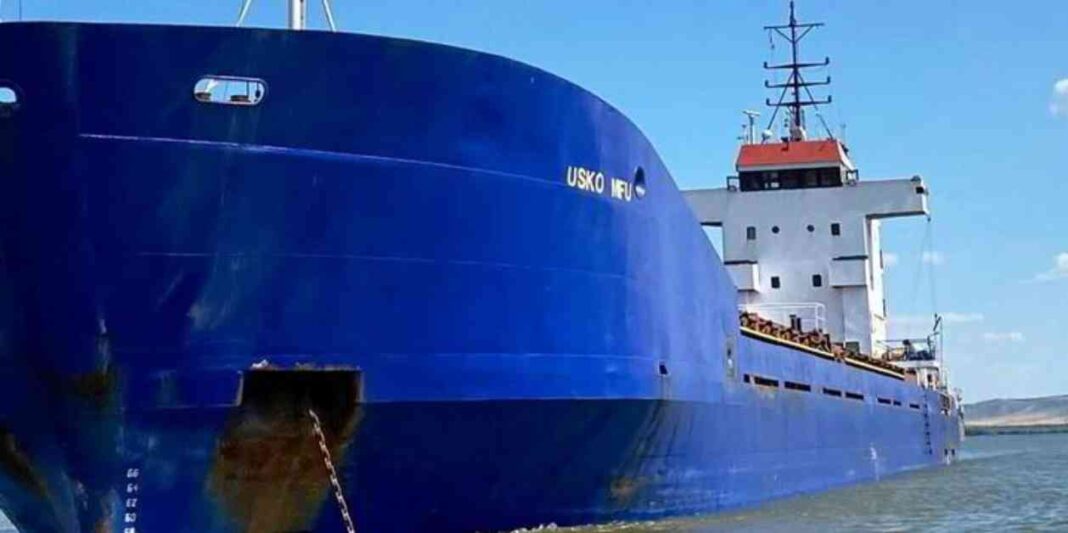Seafarers Face Legal Consequences for Docking in Crimea
Ukrainian authorities have taken a stern stance against vessels docking in Crimea, a region annexed by Russia. The latest development involves the charging of the second senior officer of a small cargo ship, the Usko MFU, for trading in Crimea. The ship, with a deadweight of 2,850 tons, was detained in July, and the unidentified crew member now faces up to five years in prison. This action follows the arrest of the ship’s master, a citizen of Azerbaijan, who was commanding the vessel at the time of its seizure by Ukraine.
Kyiv’s determination to prosecute vessels involved in trade with Black Sea ports under Russian control stems from Moscow’s invasion of Ukraine in 2022. Despite these efforts, the trade continues to thrive, with agricultural products from Russian-occupied regions being sold and transported to various destinations, primarily in the Middle East. The Usko MFU came under Ukrainian authorities’ jurisdiction after it sailed within their reach just months after visiting Sevastopol in Crimea. The ship was seized near the Ukrainian port of Reni in early July, where it remains detained.
According to Ukrainian officials, the Usko MFU loaded over 3,000 tonnes of agricultural goods in Sevastopol in November 2023 for transportation to Turkey. The Azeri master of the vessel is facing charges in Ukraine for his involvement in the Crimea trade. In a recent incident at the end of May, the ship reportedly returned to Sevastopol to unload Turkish cargo while its AIS signal was turned off. While the owner of the Usko MFU remains unknown, it is managed by Usko Shipping Co, a company based in Giresun, Turkey.
Legal Ramifications and International Trade
The case of the Usko MFU highlights the legal complexities and consequences faced by seafarers engaged in trade with disputed territories. The threat of imprisonment for crew members and vessel owners underscores the serious nature of violating international sanctions and territorial regulations. As countries like Ukraine strive to uphold their sovereignty and condemn unlawful trade practices, individuals in the maritime industry must be vigilant and comply with legal requirements to avoid severe penalties.
The ongoing trade activities in Crimea raise questions about the enforcement of international sanctions and the effectiveness of monitoring maritime traffic in disputed regions. Despite efforts to restrict trade with Russian-occupied ports, the flow of goods continues, posing challenges for authorities seeking to uphold legal boundaries and deter illicit activities. The Usko MFU case serves as a reminder of the complexities involved in regulating maritime trade and the importance of cooperation among nations to address transnational issues effectively.
Implications for Maritime Security and Diplomacy
The detention and prosecution of vessels like the Usko MFU have broader implications for maritime security and diplomatic relations in the Black Sea region. As tensions persist between Ukraine and Russia, incidents involving trade in Crimea contribute to the ongoing conflict and complicate efforts to resolve territorial disputes peacefully. The involvement of foreign nationals, such as the Azeri master of the Usko MFU, adds a layer of complexity to the legal proceedings and underscores the international nature of maritime trade regulations.
The Usko MFU case also highlights the role of maritime authorities in monitoring and enforcing compliance with international laws and sanctions. By intercepting and detaining vessels engaged in illegal trade activities, countries like Ukraine demonstrate their commitment to upholding legal norms and safeguarding their territorial integrity. However, the challenges of regulating maritime traffic and preventing violations remain significant, requiring coordinated efforts and enhanced surveillance measures to address illicit trade effectively.
In conclusion, the case of the Usko MFU underscores the legal risks and consequences faced by seafarers involved in trade with disputed territories like Crimea. As countries strive to uphold their sovereignty and enforce international sanctions, individuals in the maritime industry must adhere to legal requirements and avoid engaging in unlawful activities. The ongoing trade dynamics in Crimea raise questions about the effectiveness of monitoring maritime traffic and the need for enhanced cooperation among nations to address transnational challenges. By addressing these issues collectively, countries can strengthen maritime security, promote diplomatic dialogue, and uphold legal norms in the global shipping industry.
